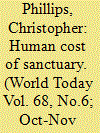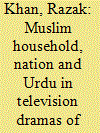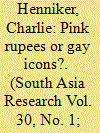| Srl | Item |
| 1 |
ID:
128610


|
|
|
| 2 |
ID:
190722


|
|
|
|
|
| Summary/Abstract |
The article explores the genealogies of Muslim cultural and Urdu language reform in late nineteenth century colonial India and traces its post-colonial trajectories in contemporary public culture in Pakistan. It does so by analysing the language and gender politics of Urdu in two Pakistani TV dramas, Aangan Terha (Crooked Courtyard), written by Anwar Maqsood and screened on the government-run Pakistan Television Corporation (PTV) channel in 1984, and Quddusi Sahab ki Bewah (The Widow of Mr. Quddusi), scripted by Faseeh Bari Khan, which was telecast on ARY Digital, a global private satellite channel, in 2012. The article emphasises the gendered language and performative politics of Urdu and respectability in colonial and post-colonial South Asia.
|
|
|
|
|
|
|
|
|
|
|
|
|
|
|
|
| 3 |
ID:
093726


|
|
|
|
|
| Publication |
2010.
|
| Summary/Abstract |
Discussions of contemporary films and publications now illustrate the problematic terminology of terms like 'gay' or 'camp' in India, coupled with increasing speculation and reference to homosexuality. This article analyses media representations of Hindi cinema stars and highlights the emergence of some male stars as icons for gay communities within India and in the diaspora. Analysis of the way Bollywood celebrities are represented in India's press in-dicates that the media has been crucial for this emergence to occur. Focussing on Shah Rukh Khan, Bollywood's most recognisable and influential star today, the article argues that while a cult of interpretation surrounds Bollywood icons, there is a definite trend of stars confronting and negotiating sexually ambiguous spaces, both on screen and off. Media 'gossip' and specific public responses thus serve a variety of commercial as well as socio-cultural and wider political purposes.
|
|
|
|
|
|
|
|
|
|
|
|
|
|
|
|
| 4 |
ID:
146135


|
|
|
|
|
| Summary/Abstract |
Scholarly interest in the camp has grown over recent years, inspired in part by Giorgio Agamben's (1995; Homo Sacer: Sovereign Power and Bare Life) work. Scholarship in this area has built on Agamben's view of the camp as an abject space of exception and bare life but also, in reaction to this view, has theorized the camp as a political and social space which constitutes refugees and displaced persons as political subjects, active in demanding rights and social justice. Building on existing scholarship, this article draws attention to another important trend in the camp which has emerged alongside the growing activism of refugee populations, dissatisfied with their lack of rights and abject conditions. This is the trend of engaging refugees to become self-governing in the management of the camp, to think of the camp in terms of community development, with camp life providing the experiences through which refugees are to refashion themselves as resilient, entrepreneurial subjects. Our analysis examines this trend through the issue of humanitarian emergency governance of refugees and IDPs and within the context of reforms undertaken by the United Nations—specifically, through what we term “resiliency humanitarianism.” We use this term to suggest a particular rationale of care, camp coordination, and management which emerges within neoliberal government and which focuses on assisting refugees and IDPs to adapt to, and survive, crisis with the aim of responsibilizing them.
|
|
|
|
|
|
|
|
|
|
|
|
|
|
|
|